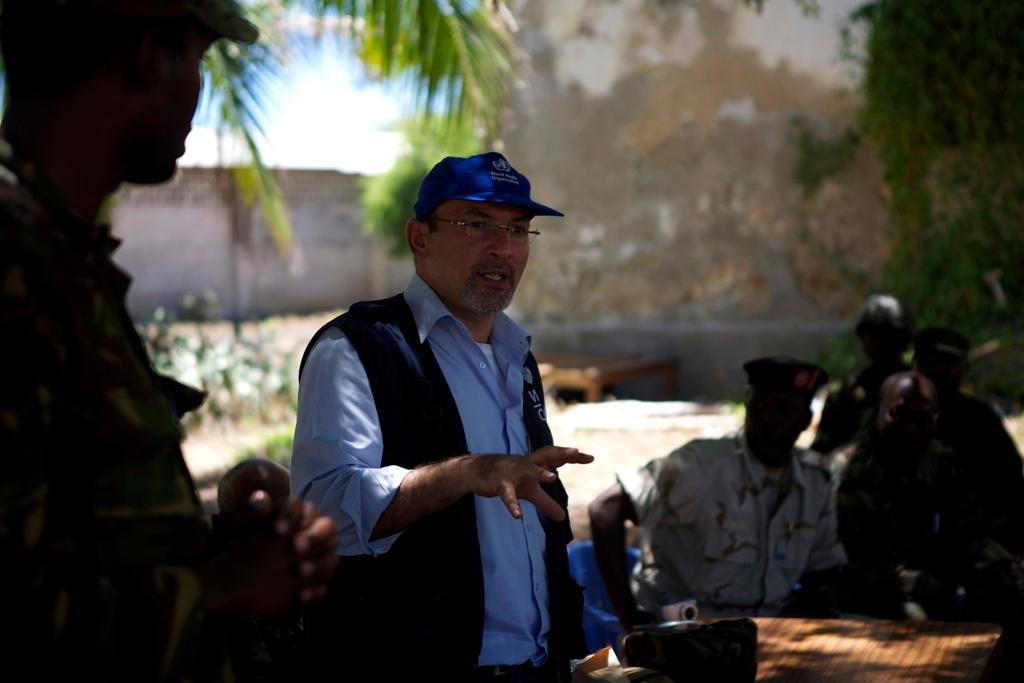Somalia: Aid slow to return to key port city
Dr. Omar Saleh, World Health Organization (WHO) emergency coordinator for Somalia, speaks to workers, local people and security officials at Kismayo General Hospital.
KISMAYO, Somalia — Al Shabaab lost control of this port city late last month, its Al Qaeda-aligned fighters either fleeing into the countryside or melting into a wary population of civilians.
A coalition of Somali and Kenyan soldiers are, for now, maintaining an armed peace. But repairing the damage done by four years of brutal Al Shabaab rule might be an even more difficult task.
Basic services — like education, sanitation and health — are in ruins and aid agencies are, so far, mostly unwilling to take a chance on the city’s precarious security.
Dr. Omar Saleh is the exception. Saleh, the emergency coordinator for Somalia at the World Health Organization (WHO), says it is essential to get in quick and deliver support.
“This window might close soon, so we have to take advantage of the opportunity,” he said last week after delivering 1.8 tons of medical hardware and drugs to the dilapidated Kismayo General Hospital.
“What we are doing is giving them the tools to operate in better conditions.”
He hopes the hospital’s shoestring staff will be able to carry out basic emergency surgery, treat women and children and deliver babies, at least until other humanitarian agencies start to arrive.
Saleh also intends to kick-start a vaccination program, the first in more than three years, to preempt outbreaks of measles and other preventable diseases.
The hospital itself is in a sorry state. There is one semi-functional operating room. It has a sagging roof, a rusting surgical table and broken spotlights. The toilet down the corridor stinks and supplies in the pharmacy are running low.
The only qualified medical worker is Dr. Abdisamir Haji, who remained on as the only doctor in Kismayo during the years of Al Shabaab’s reign. For him, the support that arrived last week could not come soon enough.
“It was very difficult to work in this anarchy,” he said. “We were under a lot of pressure and very isolated.”
Basic medical supplies were in short supply and treatment difficult, not least because Al Shabaab fighters occupied part of the hospital compound.
Now, he said, with Al Shabaab no longer in charge, there was a chance things might improve.
“The hospital is reviving. It gives people hope,” Haji said.
But hope and fear go hand-in-hand in Kismayo.
A destroyed column lies in chunks in the middle of Liberty Square, a tree-lined space in the center of the city created to honor Somalia’s heroes. Al Shabaab militants turned it into a public ground for executions and other brutal punishments.
After a Sharia court passed judgment, accused spies were shot and adulterers stoned to death. Alleged thieves had their limbs hacked off while others were flogged for skipping prayers, smoking cigarettes or chewing khat, the popular narcotic leaf that Al Shabaab banned.
The trauma is clear. “Everything was terrible under Al Shabaab. Everyday we lived in fear,” said one resident who, like others interviewed by GlobalPost, did not want to be identified.
As in other towns vacated by the militants over the last 14 months, there was little fighting in Kismayo itself. The startling war damage of the capital Mogadishu is largely absent.
Instead, the city suffers from neglect. Kismayo is ramshackle — mostly low-rise, tin-roofed and sprawling — separated from a cerulean sea by a ribbon of white sand.
Out to sea are a series of lozenge-shaped islands that turn the inner waters into calm lagoons. Rusting shipwrecks jut out of the ocean behind them.
Along the broad sandy streets, wooden shacks have been attached at ground level to serve as shops. Under awnings, little groups of people gather, enjoying shade from the searing sun.
But there do not seem to be many people here. The UN refugee agency estimates that 15,000 fled Kismayo in September as the assault on the city loomed. Few have returned, reflecting concerns that Al Shabaab could make a comeback, or that renewed conflict might erupt over who controls both the city and its lucrative port.
We rely on support from listeners and readers like you to keep our stories free and accessible to all. Monthly gifts are particularly meaningful because they help us plan ahead and concentrate on the stories that matter. Will you consider donating $10/month, so we can continue bringing you The World? Donations made between now and Dec. 31 will be matched 1:1. Thanks for investing in our work!
